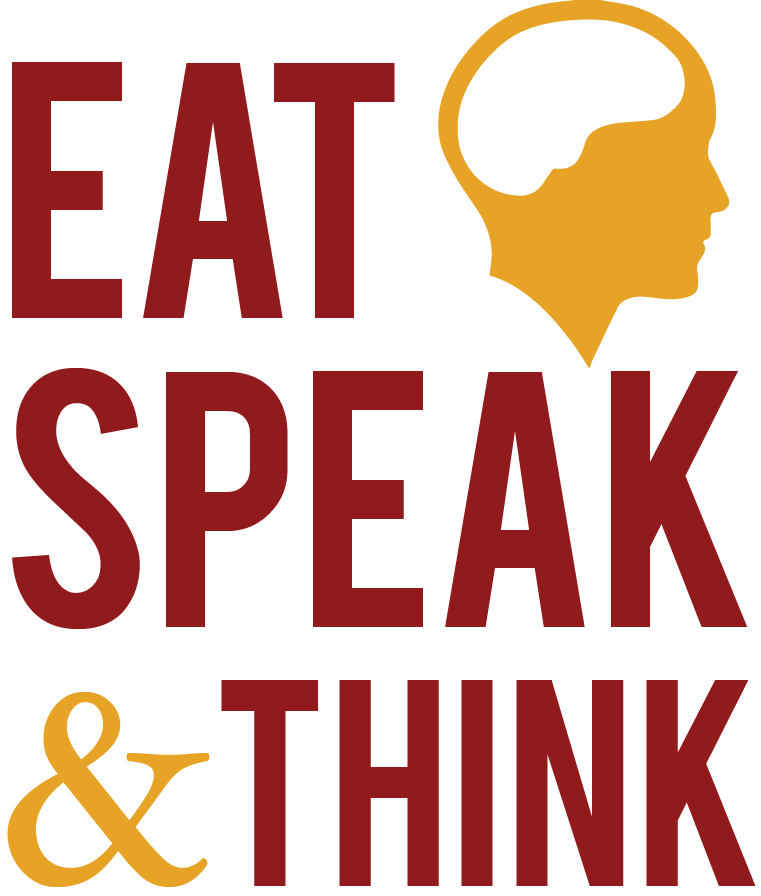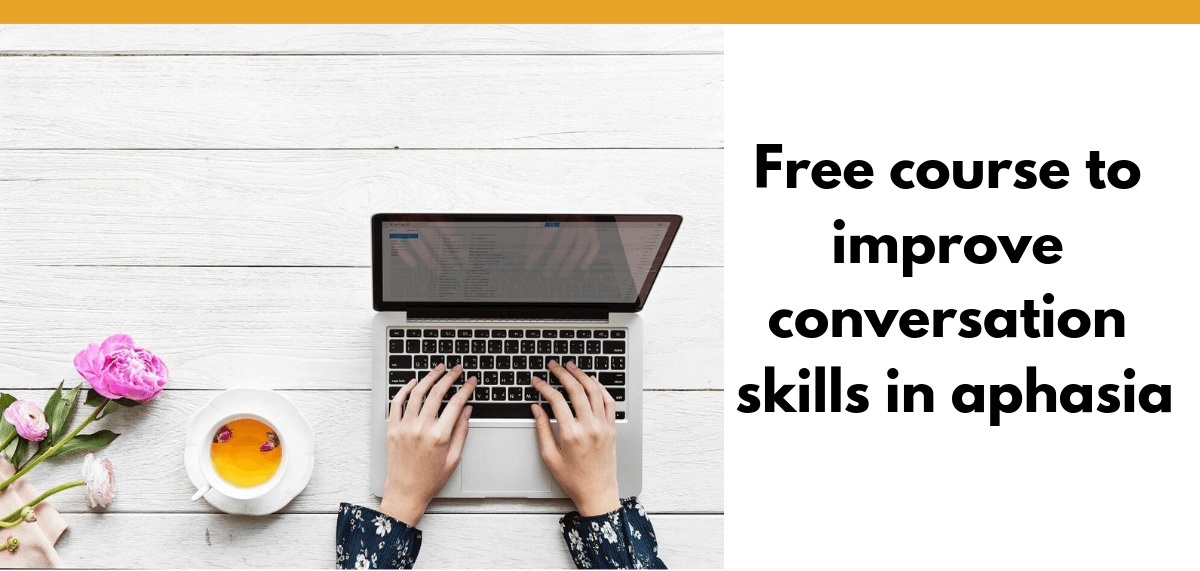You can access a free course to improve conversation skills in aphasia, called Better Conversations with Aphasia (BCA). The course, which is open to everyone, is specifically designed to promote conversation therapy using video as a powerful tool. If you’re a speech-language pathologist (SLP), you’ll find extensive resources to help people with aphasia improve conversation skills. (Just to be clear, I have no affiliation with the course.)
Outline:
- Why you should take this course.
- What you’ll learn from BCA.
- What is conversation therapy?
- Who is a candidate?
- Final thoughts.
- Related Eat, Speak, & Think posts.
- Reference
Why you should take this course
If you work with people who are living with aphasia, you’ll know that conversation can be very frustrating. While we work to directly improve speech and language skills, including establishing intensive home exercise programs for aphasia recovery, we should also consider direct intervention to improve conversation skills.
Conversation mediates every social interaction, and impaired ability to communicate leads to decreased quality of life. Impaired communication contributes to job loss, divorce, loss of self-esteem, social isolation, and depression. I’m all for anything we can do to improve someone’s ability to communicate in real-life conversation.
So I recently signed up for University College London’s free self-paced online course “Better Conversations with Aphasia” (BCA). Suzanne Beeke, PhD, and colleagues developed BCA to promote using video as a powerful teaching tool to directly improve conversation.
What you’ll learn from BCA
The course is designed around two paths. One path is intended for SLPs, and the other path uses aphasia-friendly language and visuals. However, all the information and resources are available to everyone. To better support learning, each module includes text and audio/video.
Information for everyone
- Discover the complexities of natural conversation.
- Learn what conversation therapy is.
- Watch video examples from real people living with aphasia.
- Read about the supporting research.
- Determine if conversation therapy is right for you, your loved one, or your patient.
Additional training and resources for SLPs
- Learn how to do conversation therapy.
- Watch video and read an in-depth case study.
- Learn how to measure objective outcomes without transcribing.
- BCA Barriers and Facilitators Checklist (free course download).
- POWERS (Profile of Word Errors and Retrieval in Speech).
- Goal Attainment Scaling in Rehabilitation (GAS) (free).
- Obtain tools to measure changes in feelings and participation (outcome measurement tools).
- Communication Disability Profile (CDP).
- Conversation Analysis Profile of People with Aphasia (CAPPA).
- Aphasia Impact Questionnaire (donation requested).
- Better Conversations Rating Scales (free course download).
- Access resources including lesson plans, materials for eight sessions, and videos.
- Use forums to ask questions and discuss issues.
A note about recommended materials
You don’t need to purchase anything in order to do conversation therapy. Some of the tools that Dr. Beeke recommends are for sale and some are free, as noted above.
In addition to the materials above, Dr. Beeke and colleagues recommend additional handouts from the SPPARC book (Lock et al 2001). The book is “currently out of stock” as of 1/30/19, but hopefully will be available soon.
What is conversation therapy?
While the course goes into much more detail, simply put, the goal of conversation therapy is to improve conversation skills between a person living with aphasia and one of their usual communication partners.
Specifically, the SLP and the pair use video recordings to increase awareness of positive and negative behaviors during conversation. The SLP guides discussion of different strategies to try and provides training. Then the pair try out the strategies during another recorded conversation. And the process continues until the pair have successfully improved their interpersonal communication skills.
Who is a candidate?
A person living with aphasia and a conversation partner have to be open to watching themselves on video and reflecting on what they see. And the conversation partner has to have the time and willingness to work on these skills.
In addition, both people have to accept that this therapy is meant to help communication with current speech/language ability. So it’s important that they understand that conversation therapy is not intended to improve speech and language skills.
Related Eat, Speak, & Think posts
- How intensive home exercise helped my patient talk again.
- Improve aphasia outcomes by creating intensive home exercise programs.
- How to assess pragmatic skills in adults with brain injury.
- Easy discourse measures to demonstrate improvement.
Final thoughts
I’ve hesitated to use video to improve interpersonal communication in therapy, because it felt very unstructured and open-ended. In addition, I didn’t want to stray into the territory of a marriage counselor. Asking people to analyze how they’re communicating via video is a very intimate exercise. And I just didn’t feel equipped to handle that.
But at the same time, I’ve been considering using video for a few years now because I’ve had good success using audio in therapy. I learned how to use audio in therapy from my LSVT LOUD training, and I’ve extended using audio to many other therapy contexts. While it seems obvious that audio can be a helpful too, I needed the structure of a specific program to learn how to use audio as a tool.
Now I’m excited to discover the BCA course, which is providing me with the framework to learn how to use video in therapy in a structured way to improve conversation skills.
What about you? If you use video in therapy, please share some tips in the comments. If you don’t use video, will you sign up for the free course?
Reference
Beeke S, Sirman N, Beckley F, Maxim J, Edwards S, Swinburn K, Best W. 2013. Better Conversations with Aphasia: an e-learning resource. Available at: https://extend.ucl.ac.uk/
Featured image by rawpixel on Unsplash.
Lisa earned her M.A. in Speech-Language Pathology from the University of Maryland, College Park and her M.A. in Linguistics from the University of California, San Diego.
She participated in research studies with the National Institute on Deafness and other Communication Disorders (NIDCD) and the University of Maryland in the areas of aphasia, Parkinson’s Disease, epilepsy, and fluency disorders.
Lisa has been working as a medical speech-language pathologist since 2008. She has a strong passion for evidence-based assessment and therapy, having earned five ASHA Awards for Professional Participation in Continuing Education.
She launched EatSpeakThink.com in June 2018 to help other clinicians be more successful working in home health, as well as to provide strategies and resources to people living with problems eating, speaking, or thinking.



Hi, I am Komal Katyayan, writing from India and I am delighted to read this article, looking forward to joining the course as there not much the course curriculum of slp.
Thanks and regards
Komal Katyayan
+91 9818825955
komalkatyayan@gmail.com
I hope you find the course useful! You may also be interested in these two posts:
https://eatspeakthink.com/24-podcasts-adult-medical-speech-language-pathologists/
https://eatspeakthink.com/find-asha-ceus/
[…] Free course to improve conversation skills in aphasia. […]